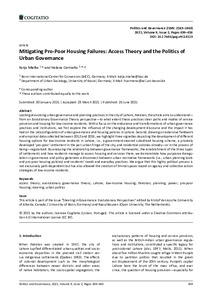| dc.date.accessioned | 2021-07-23T07:57:57Z | |
| dc.date.available | 2021-07-23T07:57:57Z | |
| dc.date.issued | 2021-06-25 | |
| dc.identifier | doi:10.17170/kobra-202107234397 | |
| dc.identifier.uri | http://hdl.handle.net/123456789/13032 | |
| dc.description.sponsorship | Gefördert durch den Publikationsfonds der Universität Kassel | |
| dc.language.iso | eng | |
| dc.rights | Namensnennung 4.0 International | * |
| dc.rights.uri | http://creativecommons.org/licenses/by/4.0/ | * |
| dc.subject | access theory | eng |
| dc.subject | evolutionary governance theory | eng |
| dc.subject | Lahore | eng |
| dc.subject | low-income housing | eng |
| dc.subject | Pakistan | eng |
| dc.subject | planning | ger |
| dc.subject | power | eng |
| dc.subject | pro-poor housing | eng |
| dc.subject | steering | eng |
| dc.subject | urban politics | eng |
| dc.subject.ddc | 320 | |
| dc.title | Mitigating pro-poor housing failures: Access theory and the politics of urban governance | eng |
| dc.type | Aufsatz | |
| dcterms.abstract | Looking at evolving urban governance and planning practices in the city of Lahore, Pakistan, the article aims to understand—from an Evolutionary Governance Theory perspective—to what extent these practices steer paths and modes of service provision and housing for low-income residents. With a focus on the endurance and transformations of urban governance practices and institutions, we first explore the influence of the changing development discourse and the impact it has had on the (re)configuration of urban governance and housing policies in Lahore. Second, drawing on extensive fieldwork and empirical data collected between 2012 and 2016, we highlight three vignettes depicting the development of different housing options for low-income residents in Lahore, i.e., a government-steered subsidised housing scheme, a privately developed ‘pro-poor’ settlement in the peri-urban fringe of the city, and residential colonies already—or in the process of being—regularised. By analysing the relationship between governance frameworks, the establishment of the three types of settlements and how residents manage to access housing and services there, we demonstrate how purposive deregulation in governance and policy generates a disconnect between urban normative frameworks (i.e., urban planning tools and pro-poor housing policies) and residents’ needs and everyday practices. We argue that this highly political process is not exclusively path-dependent but has also allowed the creation of liminal spaces based on agency and collective action strategies of low-income residents. | eng |
| dcterms.accessRights | open access | |
| dcterms.creator | Mielke, Katja | |
| dcterms.creator | Cermeño, Helena | |
| dc.relation.doi | doi:10.17645/pag.v9i2.4113 | |
| dc.subject.swd | Pakistan | ger |
| dc.subject.swd | Politik | ger |
| dc.subject.swd | Stadtverwaltung | ger |
| dc.subject.swd | Steuerung | ger |
| dc.subject.swd | Wohnraum | ger |
| dc.subject.swd | Armut | ger |
| dc.type.version | publishedVersion | |
| dcterms.source.identifier | eissn:2183-2463 | |
| dcterms.source.issue | Issue 2 | |
| dcterms.source.journal | Politics and governance | eng |
| dcterms.source.pageinfo | 439-450 | |
| dcterms.source.volume | Volume 9 | |
| kup.iskup | false | |


